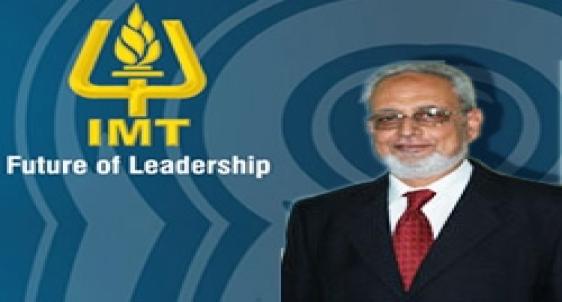
With an experience of a career spanning over 30 years in both the industry as well as the academic field, Dr. Ali talks with MBAUniverse.com about the future of MBA education. Dr. Anwar Ali took over as the Director of IMT Ghaziabad just two months back.
Prior to joining IMT Ghaziabad, Dr. Anwar Ali has been the Director of IMT Nagpur from 2005-09. Equipped with degrees from IIM Calcutta and IIT Kanpur, he has served Steel Authority of India, Durgapur; Greaves Foesco Ltd., Jamshedpur; and Gabriel India Ltd., Mumbai. He also had the opportunity to teach students at various management institutes like Xavier Institute of Management, Bhubaneshwar; Goa Institute of Management, Goa and MDI, Gurgaon. In addition to this, he runs Ali Tutorials, a coaching institute for CAT and other competitive entrance exams.
In an interview with Sreetama Datta of MBAUniverse.com, Dr. Ali states that in spite of the recent hiccups, MBA education has a great future. In the interview, he talks about the present situation of MBA education in India, and his focus areas at IMT Ghaziabad.
Excerpts from the interview:
Q: You have had a career of more than 30 years in both corporate and academic domain. What’s been the journey like?
A: After completing my engineering in Metallurgy from IIT, I joined Steel Authority of India which is a Public Sector Unit. But very soon I realised that Public Sector Units don’t provide much opportunity for improvement in ones career. So I left it and joined IIM Calcutta to pursue my MBA. After that, I joined the private sector where I switched jobs regularly. I worked in places like Jamshedpur and Mumbai that have good B-schools. As a hobby, I took up part-time teaching at S.P. Jain, Mumbai. That is when I found out that teaching is giving me more satisfaction than working in the industry. This was when I went back to IIM Calcutta for a Doctorate degree. Since 1990, I am into full time academics. Working in the industry has helped me tremendously as I can relate with theory and practice which in turn helps the students understand the concepts in a much better manner.
Q: What is the importance of MBA education in a country like India?
A: I think it’s extremely important. In the top B-schools of India like the IIMs, MDI and IMT, the first year is all about developing a strong ground in the basics of management. Even the doctorate students have to undergo the same. It helps the students develop an all-round perspective. That gives a very good foundation to the MBAs when they rise in an organisation. On the onset of their careers when they work in departments like marketing or sales, they concentrate on that particular area. But when they become the General Manager of a company, they need the basic knowledge. First year is especially very important. The second year of elective papers also gives them a good depth of particular areas they are interested in. It provides them with good exposure to the practical field also as they have to do a lot of project work and case studies. But here I am talking about good B-schools only. An institute which is not much reputed doesn’t have a good faculty or a good affiliation.
Q: What are the challenges faced by the management education today?
A: Today, with a background of how global business environment has shaped up in the last 12 months or so, B-schools need to redesign their curriculum in a big way. There are three broad areas where the B-schools need to focus on.
After the shock which came from America last year, we need to understand and incorporate an important area in the curriculum: Risk Management. MBAs, especially in the financial domain were accused of taking too many risks, leading to the collapse of global institutions like Lehman Brothers. We are now working on designing a specific course in the area of Risk Management. We have recruited people from some of the reputed banks to help us in this.
Ethical behaviour is another very important focus area for management education. Clearly, what has happened in the recent past leaves a lot of room for improvement. If ethics is ingrained in the students then failures will not happen at all. We are developing social projects for rural welfare. That is happening both in IMT Nagpur and Ghaziabad.
Finally, while at B-school, entrepreneurship development is a becoming very important. Many more students are interested in entrepreneurship straight after their MBA education. At IMT, we are working on this need too.
Q: In this age of economic slowdown, for the lakhs of MBA aspirants who read MBAUniverse.com, the main concern is placement. As a Director of a leading MBA institute in India, how would you react to the placement situation?
A: Yes, it has been a bad year indeed. Last year, at most of the decent B-schools, the entire placement process took just a few days. This year the situation is very different. But IMT Ghaziabad has been rather fortunate. We have around 347 students of which only 15 are left to be placed. We have quite a number of companies in the pipeline so we can expect them to be placed by the end of this month. Through constant interaction with our students, we have been able to convince them that it is a bad year and realities should be accepted. We also took help from placement consultancies this year which is unprecedented. Salaries are low and placements are taking a long time, but hopefully next year will be better.
As an important step, from this year, we have devoted one of the senior level employees at IMT entirely for the placement process. This will bring more focus and discipline to the placement exercise.
Q: In this light, what according to you is the future of MBA education from an MBA aspirant’s point of view?
A: Let’s not make a conclusion only on the basis of this year. This downturn had to happen. Whatever mistakes had been committed are being rectified. The Indian market situation is bound to improve very soon, hopefully from the end of this year itself. We are in a very good situation, and as everyone is saying, India and China are going to rule the world economy. So the future of MBAs is very positive, very bright.
Q: Prior to this, you were the Director of IMT Nagpur. What is your vision for IMT Ghaziabad as a Director?
A: As I said, I plan to revamp the curriculum to meet the new requirements. I also intend to get more experienced faculty. My focus will be more on industry practitioners, who have strong academic backgrounds. We are already in dialogue with senior corporate executives who have worked in companies like Coca Cola, HDFC Bank, ABN Amro and AIG among others.
People who have quality experience in the private sector can do justice in imparting industry required education to the students. This will help our students since when they start working; they won’t have to undergo much training and can start contributing from day one itself. After all, MBA is a practice oriented educational format.
Q: Any other plans on the anvil for IMT Ghaziabad?
A: From the faculty point of view, I would like to create a very conducive environment, at par with the IIMs. For the faculty, research leading to publications in academic journals is the key. We already provide many research incentives. We sponsor our faculty members to all expenses paid national and international conferences too. Once the faculty has met with the academic requirements of their classes, they are totally free to engage in research and consulting. We will not interfere in their space.
I would also like stronger engagement from students in co-curricular activities. For instance, in IMT Nagpur, the student’s body was very active and used to come up with a lot of student development initiatives. I would like that to happen at IMT Ghaziabad too.
Q: CAT is going to be computer-based test from this year. What is your take on it?
A: The computer-based test is nothing but a change of mode of delivery. Otherwise, the sections and everything else in the test will be the same. It will make the job of the IIMs much easier. It will also take care of the paper leaks that happened earlier. I think it’s a step in the right direction.



























